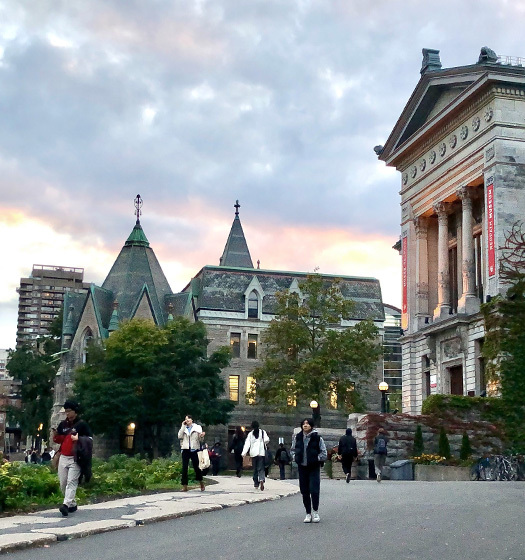Building a healthier McGill
Faced with rising mental health issues and growing student demand, McGill has established a trailblazing new approach to campus wellness. With your help, we can sustain the Student Wellness Hub's best-in-class services and programs for years to come.
The World Economic Forum cites youth mental health as the single biggest challenge facing society today.
As host to generations of young people, postsecondary institutions are at the epicentre of this public health challenge. In Canada, universities have seen surging demand for services within overloaded healthcare systems.
Knowing that student success is dependent on health, McGill has been building an exciting new model for student wellness. In just four years, McGill’s Student Wellness Hub has become the gold standard for campus wellness services in Canada.
However, the loss of emergency COVID-19 funding from the Quebec government has put some of the Hub’s programs at risk. With donor support, McGill will be able to sustain the Hub’s innovative model and continue to provide critical support to students.
Comprehensive support
In 2019, the University did away with the artificial separation between physical and mental health services, combining them into a comprehensive support system.
One of eight flagship programs offered by McGill Student Services, the Student Wellness Hub offers a full menu of wellness options:
- Clinical services. The Hub offers appointments with counsellors, advisors, dietitians, nurses, doctors, psychiatrists, sexologists, and social workers. It also hosts group therapy sessions and offers on-site blood tests.
- Health promotion. Based in the Healthy Living Annex, the Hub’s health promotion activities include workshops, art and animal therapy, peer support, a sexual wellness shop, relaxation, exercise, and virtual reality experiences.
- Telehealth and self-help. Through the Hub, students have access to several online platforms that provide telehealth and self-directed care options that are available 24/7.
Your support will help the Hub:
- Maintain a full range of physical and mental health services, programs and self-help options


“Before you can be an excellent student or a researcher or change the world in medicine, you have to be healthy to do it. There is nothing that works if your body and your mind aren’t working.”
Maya Willard-Stepan, BSc’23, Former Mental Health Commissioner of the Student Society of McGill University
Read about Maya’s work with the Hub
Focus on prevention
With the launch of the Hub, McGill moved away from an inefficient crisis management model and adopted a focus on awareness, prevention and early intervention. This involves prioritizing health promotion and building awareness of healthy living on campus.
By offering lower-intensity activities like art therapy, the Hub is helping students develop skills and habits that will prevent them from developing future health issues. This approach removes pressure from frontline services and gives students the freedom to choose what works best for them.
Your support will help the Hub:
- Maintain a welcoming multi-purpose space at the Healthy Living Annex
- Organize a wide range of health promotion activities
- Increase awareness of the Hub and healthy living through outreach campaigns


Collaborative care
To offer a more holistic approach to care, the Hub encourages collaboration at all levels. This includes:
- Cross-campus collaboration. The Hub works with all faculties and units, as well as many campus groups, to promote a university-wide culture shift around wellness.
- External partnerships. The Hub is working to expand access to care by strengthening its relationship with the Quebec healthcare system and building partnerships with off-campus services.
The Hub’s Local Wellness Advisors (LWAs) are critical to the collaborative care model. Forming the Hub’s main “spokes”, LWAs are mental health clinicians who are embedded in a specific faculty, unit or community at McGill – in other words, meeting students where they are.
Your support will help the Hub:
- Maintain an expanded network of Local Wellness Advisors
- Improve access to medical professionals and keep wait times to a minimum
Student voices
The Hub strives to keep the student voice at the heart of its programming. Specially trained student employees known as Hub Peer Supporters help organize and provide input on the Hub’s health promotion activities.
Hub Peer Supporters are also the first point of contact for students who are entering the clinic. Seen as more approachable than regular staff, Hub Peer Supporters are well positioned to provide empathy to fellow students and build awareness of the Hub’s services.
Your support will help the Hub:
- Expand the reach of the Hub Peer Supporters program
- Further integrate student voices into Hub services and activities


A growth mindset
Everyone who works at the Hub knows that finding lasting solutions to student distress requires a commitment to innovation and quality improvement. That’s why the Hub has adopted a growth mindset that encourages agility and allows for regular adjustments to service models.
The Hub monitors usage trends and student satisfaction through surveys, feedback sessions, and rigorous data collection. When services or programs are not working as expected, they are quickly altered.
Your support will help the Hub:
- Adapt to rapidly evolving student needs
- Regularly adjust programming based on student input

